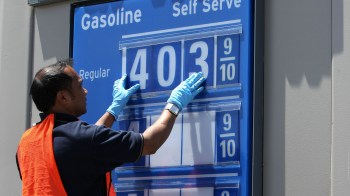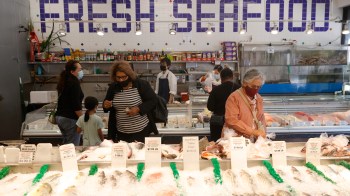Gas prices are up, food is up, but no ‘inflation’
Kai Ryssdal: There are two ways to look at the inflation report that came out this morning. One is in the cold, analytical — one might say, bloodless — way that economists and analysts like to do it. What they call core inflation doesn’t count food and energy, and it was up just a tenth of 1 percent last month. The other way is the way regular people live — eating and driving — like these folks.
Vanessa Robins: Everything is high, higher and highest.
Arthur Saginian: My wife does the shopping for that stuff, so I have no idea what the costs or anything else are.
Raul Banuellos: We haven’t seen it yet, I think it’s too early right now.
Tony Morillo: Anything that’s kind of produced or manufactured has to be shipped over here, right? So oil prices are going up. It’s obviously going to affect prices.
Melissa Farwell: The main thing that I’ve noticed an increase in that has hurt my budget the most has been gas.
That was Vanessa Robins in Washington, Arthur Saginian, Raul Banuellos, Tony Morillo, and Melissa Farwell here in Los Angeles.
The next voice you’re going to hear is Marketplace’s David Gura on why the government ignores the way we live.
David Gura: For one thing, if you look at energy prices and the cost of food, they bounce around a lot.
Gus Faucher is an economist with Moody’s Analytics.
Gus Faucher: Gasoline prices can go up sharply in one month and then they can fall off in the next month, because of, you know, higher oil prices and global geopolitical concerns.
Lately, there’s been turmoil in the Middle East. And bad weather can change food prices.
Michelle Girard is with RBS. She says that’s why the Federal Reserve uses “core inflation” when it sets interest rates.
Michelle Girard: Policy makers can’t just sort of say, ‘OK, we need to respond to the big increase, and then when they reverse, we need to respond.’ I mean, we’d have interest rates going up and down all over the place.
The Fed’s powers are limited. If an earthquake or a revolution changes commodity prices, it can’t do a whole lot, but Girard says Ben Bernanke and his colleagues don’t live in a bubble. They know what a tank of gas costs, and what that means for the whole economy. Rising food and energy prices affect other things. If oil goes up, you could pay more for a train ticket or a new TV.
Nigel Gault, chief economist at IHS Global Insight, looks for that kind of spillover. He says prices for most other goods and services didn’t go up that much, which suggests…
Nigel Gault: With consumers really being squeezed by these higher food and energy costs, they’re spending power being reduced, that it’s quite difficult to push through prices in other areas because consumers are going to resist.
And if they keep resisting, it could be because of the price of gas.
In Washington, I’m David Gura for Marketplace.
There’s a lot happening in the world. Through it all, Marketplace is here for you.
You rely on Marketplace to break down the world’s events and tell you how it affects you in a fact-based, approachable way. We rely on your financial support to keep making that possible.
Your donation today powers the independent journalism that you rely on. For just $5/month, you can help sustain Marketplace so we can keep reporting on the things that matter to you.


















